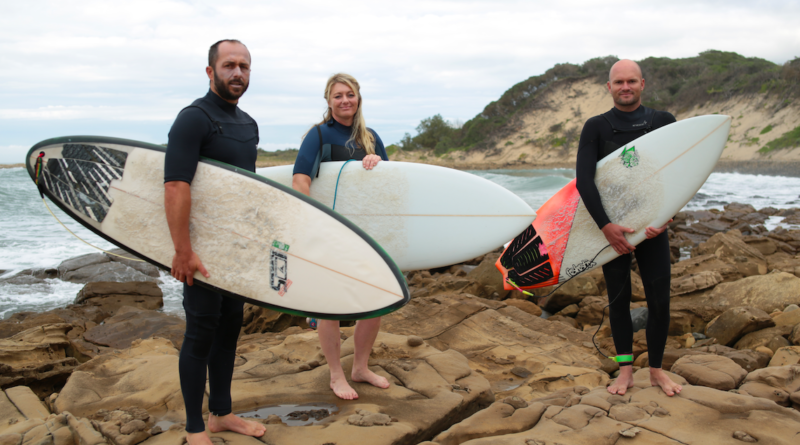INTERVIEW: On new Sharkfest special, sharks battle with surfers
Photo: Denver Struwig, a shark-attack survivor, prepares to surf with wife Kristy Struwig and friend Tyrell Jordan. Their story is featured on Shark vs. Surfer. Photo courtesy of National Geographic / Kira Ivanoff / Provided by press site with permission.
Sharkfest on National Geographic continues Sunday, Aug. 2 with a special that seems to promise certain doom for the human species. Shark vs. Surfer airs at 8 p.m., with an encore presentation set for Thursday, Aug. 13 at 9 p.m.
The special visits shark-infested surf spots around the globe and details several occurrences when surfers faced off against the chomping marine animals. The network will share plenty of amateur footage caught on camera and interviews with survivors.
Also helping to differentiate shark fact from shark fiction will be Dr. Stephen Kajiura, professor in the department of biological sciences at Florida Atlantic University, and Ryan Johnson, research coordinator for Blue Wilderness Research Unit. For both experts, sharks have been a fascination for many years.
“I’ve been working with shark-human research for 20 years, and I think a lot of scientists like myself we struggle to get our messages out there through pure academia,” Johnson said in a recent phone interview with journalists. “And this is where an event like Sharkfest becomes so powerful for scientists to get their message out. With National Geographic and Sharkfest, you can get your messages out to millions of people that you can’t otherwise, and that is incredibly powerful. A lot of the children and the kids I speak to, their passion for sharks, which is incredible, comes from watching documentaries such as those shown on Sharkfest, so I believe it’s a huge and powerful tool to get out our message of conservation science and to generate fascination of sharks.”
For this year’s Sharkfest, in addition to being featured on Shark vs. Surfer, Johnson can also be seen on Shark vs. Whale. These TV appearances are the next step in a career devoted to these marine animals. In the past his research has looked at how the great white shark cage-diving tourist industry can change shark behavior and cause danger to humans, how to use satellite and acoustic tracking to find great white sharks, and the bite strength of great whites.
For Kajiura, the global reach of National Geographic is so impressive, and he loves that Sharkfest appeals to everyone from children to adults. “You’ve got the potential to reach a tremendous audience, and I think that’s really valuable,” Kajiura said. “It gives us an opportunity to inform a huge audience that we would typically not have the ability to access.”
Kajiura received his doctorate in zoology from the University of Hawaii and his Master of Science from the Florida Institute of Technology. His area of expertise, according to his official biography, is in the sensory biology of sharks and rays with an emphasis on electro-sensory systems.
The two experts are positively gleeful when talking about sharks. They rationalize a common person’s fear of these sometimes ferocious animals by focusing on the science and the research.
“I grew up in New Zealand, which as you probably know, nothing more than a big island, so the ocean and being in the ocean is central here,” Johnson said. “I grew up on a beach called Shark Alley. I was fascinated by Jaws like a lot of kids my age. I always thought dolphins were the good guys and sharks were the bad guys, but my actual break and my start into sharks and working with sharks was getting my master’s here after I’d come over to South Africa.”
Johnson was in South Africa at a time when 18 shark attacks drove people away from the beaches, and eight of these attacks were credited to great whites, his research species of choice.
“It was at the same time when white shark cage-diving was becoming abundant as a tourism activity, and the government was up in arms,” Johnson said. “The public was up in arms, and they put a call out for research to look at that. I saw this chance of working with great white sharks and going to live on a small island.”
His research was fueled by adrenaline and fascination, and he began to learn about sharks’ ecology. One takeaway from his research was that this marine animal is not as invulnerable as everyone thinks. They can be ferocious and big and impressive, but they are ecologically sensitive.
“I think that’s where my fascination really was able to carry on for the next 15-20 years just because they do need our help,” Johnson said. “They do need science. They do need conservation efforts.”
While Johnson grew up on a big island nation, Kajiura was landlocked as a child, growing up in a rural farming community in southern Ontario, Canada. He didn’t even see the ocean until he was an undergraduate college student.
“But when I was a kid I would sit there, and I would love to watch Jacques Cousteau programs, Jacques Cousteau specials or Wild Kingdom with Marlin Perkins on Sunday afternoons,” Kajiura said. “And so I would be so excited when they had any sort of marine show and sharks in particular, so since I was 4 or 5, I said, ‘Sharks are really cool. I really want to do something with sharks.’ And, of course, in a small farming community in Ontario they said, ‘No, no, no. You can’t be a marine biologist. It’s not a job.’ But I decided I wanted to do that, and I actually did that.”
Now that childhood fascination has become a lifelong research pursuit.
By John Soltes / Publisher / John@HollywodSoapbox.com
Sharkfest continues on National Geographic, with Shark vs. Surfer premiering Sunday, Aug. 2 at 8 p.m., with an encore presentation Thursday, Aug. 13 at 9 p.m. Click here for more information.

